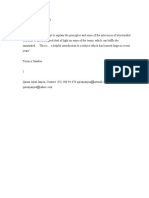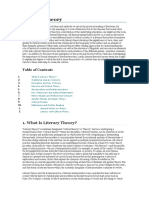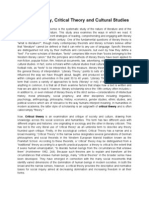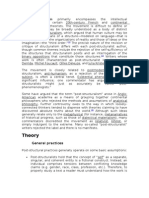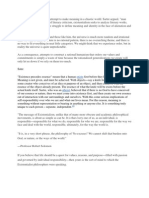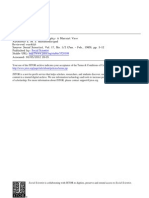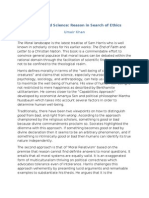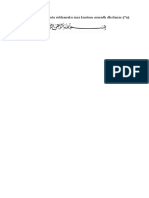Post Modernism
Post Modernism
Uploaded by
Umair KhanCopyright:
Available Formats
Post Modernism
Post Modernism
Uploaded by
Umair KhanCopyright
Available Formats
Share this document
Did you find this document useful?
Is this content inappropriate?
Copyright:
Available Formats
Post Modernism
Post Modernism
Uploaded by
Umair KhanCopyright:
Available Formats
Introducing Postmodernism to a Pre-modern Society
A Book Review by Umair Khan
Postmodernism is believed to be the culmination of the three thousand years of
philosophical speculation. Yet, it is fundamentally different from all the previous
trends, theories, and schools of thought in the history of philosophy. Where all the
energies of the past philosophers were focused to find one “grand theory” to solve
all kinds of intellectual, psychological, social, political, and economic problems,
postmodern theorists are determined to undermine the very project of establishing
one ‘grand theory’ to explain all. In fact, they go one step further and attack the
basis of forming any ‘grand theory’; they’ve brought the formation of a ‘grand
narrative’ that leads to constructing a ‘grand theory’ under the linguistic and
semiotic critique.
Whether its idealism of Plato or realism of Aristotle, empiricism of Hume or
rationalism of Descarte, idealistic dialectics of Hegel or materialistic dialectics of
Marx, existentialism of Sartre or logical positivism of Wittgenstein, every ‘grand
narrative’ has its own flaws and shortcomings and it can’t be used to solve all kinds
of problems. Whether postmodernism is revealing the true nature of human inquiry
or its a reaction to the failure of the modernity project still remains to be decided.
The jury is out. The problem with societies like Pakistan is that they are not part of
this ‘jury’. In fact, they are not even part of the audience in the ‘court room’.
Currently, there are two books under review. The two authors are trying to
introduce postmodern theory and its application to the intellectual circles in
Pakistan who work in the framework of Urdu language and do not have access to
the English sources. The first book “Ma’ Baad Jadeediyat: Nazri Mubahas” is a
collection of essays, compiled by Nasir Abbas Nayyar. This book tries to explain the
theoretical framework of postmodernism. It is quite exhaustive in the sense that it
includes essays introducing postmodernism to the general audience of philosophy
and literature. Then, some essays successfully compare and contrast
postmodernism with modernism and structuralism. Most importantly, several
important postmodern writers are introduced in various essays and their theories
are described in simple language. And finally, several important terminologies of
postmodernism are explained separately. In short, the book contains significant
information about postmodernism to make Urdu readers familiar and acquainted
with postmodernism and the debates prevalent in it.
The second book “Ma’ Baad Jadeediyat ka Doosra Rukh” is an application of
postmodern critique on Urdu literature. Authored by Zameer Ali Badayuni, a
renowned scholar and critic, the book tries to bring postmodern debates in the
realm of Urdu criticism. However, these theories are applied on writers like Mirza
Abdulqadir Baidal, Iqbal, Muhammad Hasan Askari, and Qamar jameel, almost all of
them write in modernist tradition of literature. Their writings are devoid of the kind
of ‘linguistic games’ and primacy of the interpretation of the reader over the
intentions of the writer, which are hallmark of any piece of postmodern literature.
But that is because there are very few contemporary Urdu writers who use
postmodern themes in their writings. Mr. Badayuni has provided Urdu criticism with
a precious new trend. It is now the responsibility of contemporary writers to bring
postmodern themes and ideas into their writings like Mirza Athar Baig has tried in
his stupendous novel “Ghulam Bagh” and several other writings. Only then Urdu
criticism can fully embrace the trends in postmodern critique.
Both of these books are a good attempt to introduce indigenous Pakistanis thinkers
and writers to postmodernism. The problem, however, is that Pakistani society has
not even gone through the complete transition from a feudal to a modern society. It
has not seen the fruits of modernity fully achieved in the western societies. In such
circumstances, postmodern ideas are difficult to be comprehended and still more
difficult to be accepted widely. But, that is how all theories and ideologies start;
from a handful of creative thinkers.
Postmodernism is against any kind of creating a “whole” and letting its hegemony
over other ideas. In a society that opposes Multiculturism, such philosophy which
entails multiple discourses to be treated equally and to be critiqued on equal
grounds can help in starting to create a level of tolerance required for a meaningful
debate. How well these ideas are accepted depends upon the work of writers,
scholars, and academia. As for the present, it is still to be seen how a nation that is
in search of definite answers perceives a philosophy which proclaims that there are
no definite answers.
You might also like
- Research PhilosophyDocument12 pagesResearch PhilosophyJarhan Azeem92% (13)
- The History of Philosophy: A Marxist PerspectiveFrom EverandThe History of Philosophy: A Marxist PerspectiveRating: 5 out of 5 stars5/5 (1)
- 2013 Metodine Priemone Postmodern PhilosophyDocument36 pages2013 Metodine Priemone Postmodern PhilosophyDzunisani GloryNo ratings yet
- Post StructuralismDocument6 pagesPost StructuralismDevidas Krishnan100% (2)
- Deridda ParaphrasingDocument8 pagesDeridda ParaphrasingPanjabrao ChavanNo ratings yet
- A Fad, A Cult of Jargon, or A Significant Intellectual Trend?Document12 pagesA Fad, A Cult of Jargon, or A Significant Intellectual Trend?JMannathNo ratings yet
- Theory ReviewDocument6 pagesTheory ReviewBushra Othman SidiqNo ratings yet
- Literary Theory 2Document4 pagesLiterary Theory 2fiyes44600No ratings yet
- 27681587677Document3 pages27681587677Heart BrokenNo ratings yet
- Review of Rajiv Malhotra's Being DifferentDocument2 pagesReview of Rajiv Malhotra's Being DifferentrhapsodysingerNo ratings yet
- What Is Literary Theory?Document6 pagesWhat Is Literary Theory?Luis Adalberto Berlanga AlbrechtNo ratings yet
- Social Discourse. For The Last Few YearsDocument14 pagesSocial Discourse. For The Last Few YearsVicentia BekoeNo ratings yet
- PoststructuralismDocument4 pagesPoststructuralismAdeel RazaNo ratings yet
- Abubakaer PDFDocument9 pagesAbubakaer PDFmuheabuki0No ratings yet
- Relative Versus Absolute Values (Teza Licenta Limbi Straine, 2003)Document82 pagesRelative Versus Absolute Values (Teza Licenta Limbi Straine, 2003)Scarlet VacaruNo ratings yet
- Hamlet PDFDocument11 pagesHamlet PDFبشار غبريNo ratings yet
- Catherine Belsey S Critical Practice A Critical AnalysisDocument43 pagesCatherine Belsey S Critical Practice A Critical AnalysisNayana Thampi100% (5)
- Post SirajDocument76 pagesPost SirajjanamelNo ratings yet
- Criticism Is The Theory of LiteratureDocument6 pagesCriticism Is The Theory of LiteratureRose Mutiara YanuarNo ratings yet
- What Is Literary Theory?Document14 pagesWhat Is Literary Theory?zaqrosh100% (1)
- Krist EvaDocument8 pagesKrist EvaNiKen LarasatiNo ratings yet
- Literary Theory Sara UpstoneDocument326 pagesLiterary Theory Sara UpstoneSumathi NNo ratings yet
- Across The Ancient Philosophical World EDocument4 pagesAcross The Ancient Philosophical World ERALPH ALLEN MEGUILLO RAYOSNo ratings yet
- Postmodernist Elements in Mao S ThoughtsDocument19 pagesPostmodernist Elements in Mao S ThoughtsJoão Victor VillaçaNo ratings yet
- Literary TheoryDocument15 pagesLiterary TheoryKrisha BuenoNo ratings yet
- Dialectical Materialism: An Introduction by Maurice CornforthDocument192 pagesDialectical Materialism: An Introduction by Maurice Cornforthdeepakchoudhary89100% (4)
- "Postmodernism": Is The Contemporary State of Affairs Correctly Described As Postmodern'?Document8 pages"Postmodernism": Is The Contemporary State of Affairs Correctly Described As Postmodern'?Mishaki Iccha100% (1)
- Group 6Document3 pagesGroup 6Erikamae TamondongNo ratings yet
- Post StructuralismDocument4 pagesPost StructuralismAly FahadNo ratings yet
- Theories of Literary CriticismDocument20 pagesTheories of Literary Criticismfrhana91100% (6)
- Literary Theory Critical Theory and Cultural StudiesDocument5 pagesLiterary Theory Critical Theory and Cultural StudiesGreen LightNo ratings yet
- MarxisDocument10 pagesMarxisLyla MoranNo ratings yet
- Approaches To Interpreting LiteratureDocument3 pagesApproaches To Interpreting Literaturetitilayo003No ratings yet
- J2018 - The Subject Is FreedomDocument22 pagesJ2018 - The Subject Is FreedombudimahNo ratings yet
- Literary Theory - Internet Encyclopedia of PhilosophyDocument17 pagesLiterary Theory - Internet Encyclopedia of Philosophyfrenchfaculty 1881No ratings yet
- Key Words:: PostmodernismDocument11 pagesKey Words:: PostmodernismbabyNo ratings yet
- Sem IV - Critical Theories - General TopicsDocument24 pagesSem IV - Critical Theories - General TopicsHarshraj Salvitthal100% (1)
- Introduction To Postmodernism in LiteratureDocument16 pagesIntroduction To Postmodernism in LiteratureLaura GrossiNo ratings yet
- Unit I Literary Theories and Modern Criticism Schools of Thought Course Intended Learning Outcomes Essential QuestionsDocument12 pagesUnit I Literary Theories and Modern Criticism Schools of Thought Course Intended Learning Outcomes Essential QuestionsRODERICK GEROCHENo ratings yet
- S16 Post Modernism Today 5th PrintingDocument240 pagesS16 Post Modernism Today 5th PrintingShobhit sinhaNo ratings yet
- Sheeba Postmodern LiteratureDocument11 pagesSheeba Postmodern LiteratureAmy Brigitte Fuentes TorricoNo ratings yet
- Spivak - Can The Subaltern SpeakDocument44 pagesSpivak - Can The Subaltern SpeakmaayeraNo ratings yet
- Losurdo China 8Document22 pagesLosurdo China 8stashaNo ratings yet
- Pashtoon Culture in Pashto TappaDocument186 pagesPashtoon Culture in Pashto TappaOolasyar KhattakNo ratings yet
- StructuralismDocument44 pagesStructuralismrajshreeNo ratings yet
- An Interview With Agnes HellerDocument3 pagesAn Interview With Agnes Hellervladislav suvakNo ratings yet
- Postmodern That NowDocument15 pagesPostmodern That NowrjjeNo ratings yet
- Post Structural IsmDocument8 pagesPost Structural IsmLaura de ArceNo ratings yet
- Different Types of Literary TheoriesDocument2 pagesDifferent Types of Literary TheoriesFelyn Garbe YapNo ratings yet
- Existentialism ExplainedDocument5 pagesExistentialism ExplainedAbhishek AnbazhaganNo ratings yet
- Inbound 132518164040118905Document30 pagesInbound 132518164040118905Nasir SaadyNo ratings yet
- Introduction To Literary CriticismDocument16 pagesIntroduction To Literary CriticismPaula GarateNo ratings yet
- 3520108Document11 pages3520108Gerald GiulianoNo ratings yet
- From Postmodernism To PostcolonialismDocument13 pagesFrom Postmodernism To PostcolonialismkawaiiNo ratings yet
- Foucault - S Encounter With MarxismDocument58 pagesFoucault - S Encounter With MarxismStefanTanasijevićNo ratings yet
- 1 Castoriadis in DialogueDocument7 pages1 Castoriadis in DialogueDaysilirionNo ratings yet
- King Explicitly Invokes Aristotle's Theoretical Statements On Poetics. To Argue, As Does Chinua AchebeDocument20 pagesKing Explicitly Invokes Aristotle's Theoretical Statements On Poetics. To Argue, As Does Chinua AchebeSuhrab Khan JamaliNo ratings yet
- MAli A Marxist Approach To Shaikh AyazDocument14 pagesMAli A Marxist Approach To Shaikh AyazSaadat Hussain Shahji PanjtaniNo ratings yet
- TheoryDocument16 pagesTheoryjohnNo ratings yet
- Hasan Javed - Shehre Be Mehar - Book ReviewDocument2 pagesHasan Javed - Shehre Be Mehar - Book ReviewUmair KhanNo ratings yet
- Tasawwuf Aur Aaj Kay Sufi, Ali AbbasDocument2 pagesTasawwuf Aur Aaj Kay Sufi, Ali AbbasUmair Khan0% (1)
- Afghan Endgame, Book ReviewDocument4 pagesAfghan Endgame, Book ReviewUmair KhanNo ratings yet
- Review of The Iron LadyDocument2 pagesReview of The Iron LadyUmair KhanNo ratings yet
- Tron Legacy ReviewDocument2 pagesTron Legacy ReviewUmair KhanNo ratings yet
- Morality and Science, FinalDocument3 pagesMorality and Science, FinalUmair KhanNo ratings yet
- The Biology of Belief, A ReviewDocument5 pagesThe Biology of Belief, A ReviewUmair Khan100% (1)
- Ontology of Sexual DesireDocument17 pagesOntology of Sexual DesireTanya RichardsonNo ratings yet
- 1) La Ilaha Illa Anta Subhanaka Inni Kuntum Minadh Dholimin (7x)Document7 pages1) La Ilaha Illa Anta Subhanaka Inni Kuntum Minadh Dholimin (7x)pieces of yuppyNo ratings yet
- TheosisDocument17 pagesTheosisJames FogalNo ratings yet
- Heidegger (1988) On Adequate Understanding of DaseinsanalysisDocument24 pagesHeidegger (1988) On Adequate Understanding of DaseinsanalysisAlex JozaviNo ratings yet
- Argumentative Essay On NietzscheDocument5 pagesArgumentative Essay On NietzscheBeche LumantasNo ratings yet
- Paul Horwich - Truth-Oxford University Press, USA (1999)Document85 pagesPaul Horwich - Truth-Oxford University Press, USA (1999)Cristian Santos Barturén CastillaNo ratings yet
- Spinoza QuotesDocument2 pagesSpinoza QuotesAna QueirozNo ratings yet
- Objectivity in Translation CriticismDocument4 pagesObjectivity in Translation CriticismCally docNo ratings yet
- Quietism and NaturalismDocument1 pageQuietism and NaturalismMatt GaddisNo ratings yet
- MPU2193 PCI QuizDocument9 pagesMPU2193 PCI QuizDerrick Yu Ze HangNo ratings yet
- Problem of Universals - WikipediaDocument6 pagesProblem of Universals - WikipediasaxophonemanNo ratings yet
- Kant On The Cosmological ArgumentDocument21 pagesKant On The Cosmological ArgumentJorge Sierra MerchánNo ratings yet
- Goldman PDFDocument15 pagesGoldman PDFagni mitraNo ratings yet
- 05 03 Jay ShawDocument50 pages05 03 Jay ShawSudipta MunsiNo ratings yet
- ST Thomas Aquinas Def of LawDocument2 pagesST Thomas Aquinas Def of LawjeffdelacruzNo ratings yet
- Images of The Church: Unit 4, Chapter 11Document10 pagesImages of The Church: Unit 4, Chapter 11saintmaryspressNo ratings yet
- QuotesDocument2 pagesQuotesarisNo ratings yet
- Hoeller, Stephen A. - C.G. Jung and The Alchemical RenewalDocument8 pagesHoeller, Stephen A. - C.G. Jung and The Alchemical RenewalpssamechinusNo ratings yet
- Handouts - KantDocument3 pagesHandouts - KantJan neNo ratings yet
- Theorein and The Noun Theoria (: What Is Theory?Document2 pagesTheorein and The Noun Theoria (: What Is Theory?Uday RoteNo ratings yet
- St. Augustine & Rene Descartes Perspective of The SelfDocument20 pagesSt. Augustine & Rene Descartes Perspective of The SelfJohn Kerby Amanonce100% (1)
- Ernst Cassirer's Metaphysics of Symbolic Forms, A Philosophical Commentary - Thora Ilin Bayer PDFDocument221 pagesErnst Cassirer's Metaphysics of Symbolic Forms, A Philosophical Commentary - Thora Ilin Bayer PDFatila-4-ever100% (5)
- Review The Archaeology of KnowledgeDocument5 pagesReview The Archaeology of KnowledgeLou Kramer100% (1)
- Burgess - Saul Kripke, Naming and NecessityDocument26 pagesBurgess - Saul Kripke, Naming and Necessitya4662352No ratings yet
- What Is The Relation Between Science and PhilosophyDocument25 pagesWhat Is The Relation Between Science and PhilosophyAbelooo Oo0% (1)
- Sophie's World OutlineDocument23 pagesSophie's World Outlinemarco_pangilinan100% (1)
- What Is Knowledge? Concept and MeaningDocument4 pagesWhat Is Knowledge? Concept and MeaningZeeshan Rajpoot BhattiNo ratings yet
- Between Light and Eye: Goethe's Science of Colour and The Polar Phenomenology of NatureDocument23 pagesBetween Light and Eye: Goethe's Science of Colour and The Polar Phenomenology of NatureAnis TounsiNo ratings yet
- Jorg Meurkes - Final Paper Concepts CourseDocument13 pagesJorg Meurkes - Final Paper Concepts CoursejorgisdenaamNo ratings yet
















